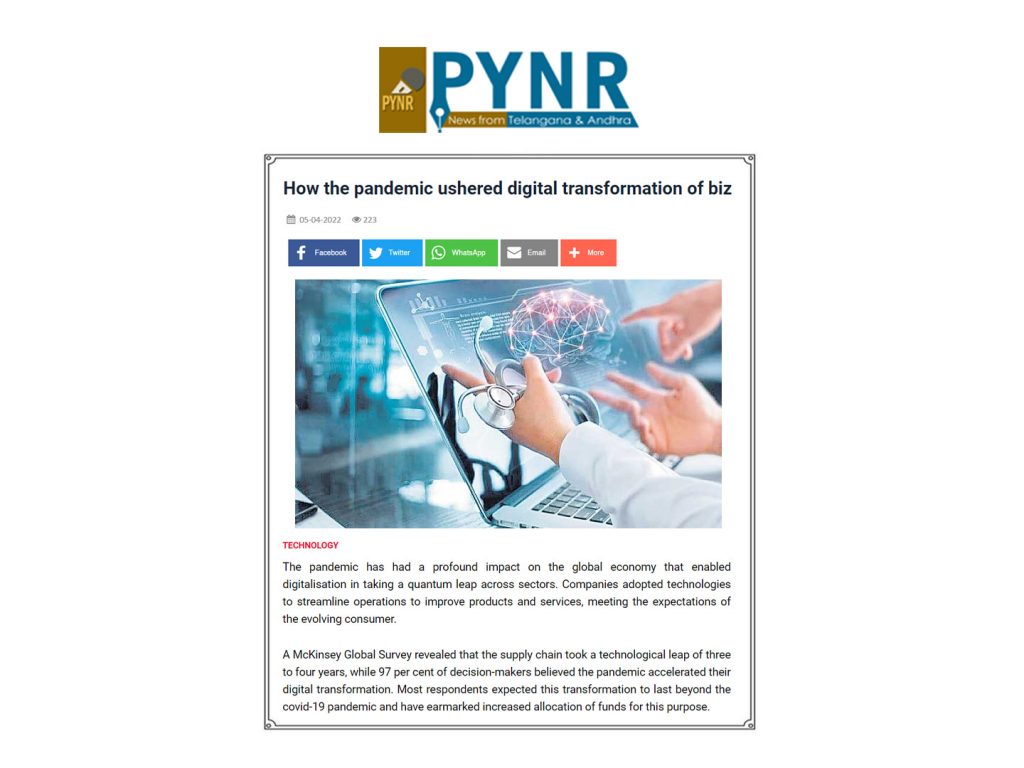Search
How the pandemic ushered digital transformation of biz

The pandemic has had a profound impact on the global economy that enabled digitalization in taking a quantum leap across sectors. Companies adopted technologies to streamline operations to improve products and services, meeting the expectations of the evolving consumer.
A McKinsey Global Survey revealed that the supply chain took a technological leap of three to four years, while 97 percent of decision-makers believed the pandemic accelerated their digital transformation. Most respondents expected this transformation to last beyond the covid-19 pandemic and have earmarked increased allocation of funds for this purpose.
For a competitive edge
The evolving economic landscape during the pandemic required businesses to make a paradigm shift in strategic thinking to remain competitive. Technology was the core element in this transition, providing access to new markets and avenues for innovation and collaboration. With augmented access to data, collaborative tools, and online markets, businesses had to quickly pivot to a new normal while ensuring a cost-effective approach. Successful organizations were the ones who equipped themselves with tech-related capabilities, invested in data analytics, and acquired the right talent to manage cybersecurity risks.
Meeting buyer expectation
In a digital-first economy, consumer behavioral patterns were a powerful driver in ushering transformation across sectors. Today, the consumer expects instant online access across multiple platforms. The ratio of consumer interactions witnessed an increased use of technology, ranging from chatbots to sale transactions.In a 2020 survey held in the immediate aftermath of global lockdowns, 95 percent of the respondents were reported to have explored new avenues for customer engagement, with 92 percent considering digital communication as critical.
Since the last year, consumer expectations have moved towards hyper-personalization in brand interaction. A Salesforce survey reveals that 66 percent of consumers expected businesses to understand their unique needs but find that only 34 percent of companies were successful in doing so. Technology holds the key to bridging this gap by gaining valuable consumer insights. Apart from personalizing products and services, consumer data has played a vital part in crafting digital marketing strategies. However, with open access to consumer data, issues relating to infringement of privacy have come to the core.
Digital platforms, including social media, have also enabled businesses to establish real-time communication across different platforms with an instant resolution of queries ensuring a seamless consumer experience. Sixty-four percent of consumers reported using multiple devices to complete online transactions and expected their purchasing pattern to be in line with their past interactions with the brand, thus, requiring businesses to use technology to ensure instant access to historical data.
Streamlining supply-chain management
The movement of people and non-essential goods during the lockdown witnessed a crippled global supply chain industry. The World Economic Forum highlighted the adverse effect on the speed of global economic recovery. For resource-hit logistics firms, rapid technology adoption was the most likely option. Companies expanded their digital capabilities by introducing innovative solutions like drone shipments to reduce wastage of goods and time, thus transforming last-mile connectivity. Many new startups cropped up to do localized delivery in specific areas and all was only possible due to the technology delivery’s short turnaround time. Those retail chains who thought retail shopping (brick and mortar) was the only way now had our doing more sales through online delivery. Organizations are now in profit-sharing mode with supply chain companies which were just a small function prior to the pandemic but now are the most critical function of their business success.
AI/ML boosting efficiency
We have witnessed rapid digital transformation with Artificial Intelligence at the helm, Indian market witnessed a valuation of USD 7.8 billion as of August 2021. Significantly, AI adoption is also becoming increasingly democratic, moving from financial or large corporations to smaller businesses. The rising use of AI/ML-embedded devices from smartphones to automobiles has further fuelled this growth. AI/ML is now entering every facet of business by providing Intelligent Process Automation and the ability to do things with supreme agility and fewer people dependent.
Increasing digital sales
As the strict lockdown created multiple disruptions to daily life, online shopping received a boost, with the e-retail market witnessing a 25 per cent growth in FY21. This growth is significant considering the overall five percent drop in India’s USD 810 billion retail markets. In the case of the MSME sector, digital sales have been critical in ensuring business continuity with 60 percent of small businesses reporting a spurt in sales with new products, services, and customers. The biggest shift is that customers are now confident in even buying high-value products online without the need to touch and feel as if they are confident that they can return the same and get better deals online.
Changing the nature of work
The most visible impact of the pandemic was the wide-scale adoption of remote working. Superior tech support coupled with web-based collaborative tools allowed organizations to ensure continuity of work despite repeated lockdowns. Even with the prospect of offices reopening soon, remote working seems here to stay. According to a survey, 77 percent of Indian employees preferred the hybrid work model for their mental well-being. Consequently, many companies have extended WFH (Work-from-Home) to WFA (Work from Anywhere) to retain skilled talent. Now any emergency public holiday is no more a business impact as businesses can now switch to online mode anytime they want to and many are moving to the hybrid workplace with hot desking.
As the modes of operations evolved, the nature of work has gone through a rapid transformation. The integration of AI, machine learning, and human skills increased the disruption in job roles exacerbated by the pandemic. As the focus on tech adoption remains unabated, these changes will continue to dictate the morphosis in existing and emerging job skills.
Read Full Article: https://pynr.in/article/how-the-pandemic-ushered-digital-transformation-of-biz
